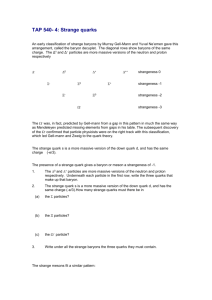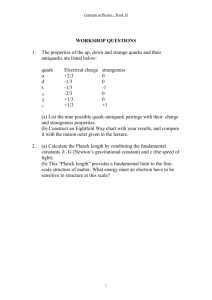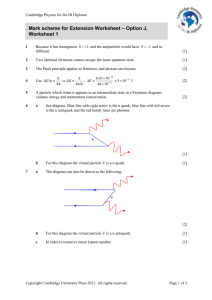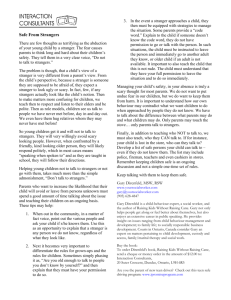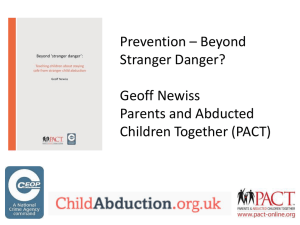TuanOutline
advertisement
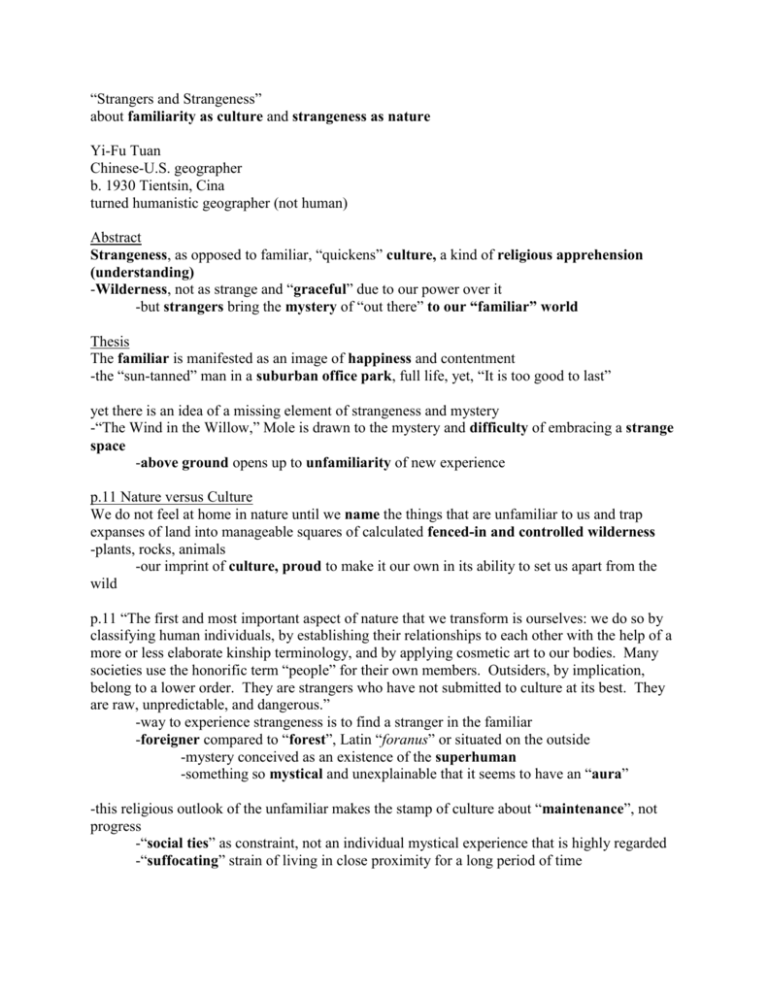
“Strangers and Strangeness” about familiarity as culture and strangeness as nature Yi-Fu Tuan Chinese-U.S. geographer b. 1930 Tientsin, Cina turned humanistic geographer (not human) Abstract Strangeness, as opposed to familiar, “quickens” culture, a kind of religious apprehension (understanding) -Wilderness, not as strange and “graceful” due to our power over it -but strangers bring the mystery of “out there” to our “familiar” world Thesis The familiar is manifested as an image of happiness and contentment -the “sun-tanned” man in a suburban office park, full life, yet, “It is too good to last” yet there is an idea of a missing element of strangeness and mystery -“The Wind in the Willow,” Mole is drawn to the mystery and difficulty of embracing a strange space -above ground opens up to unfamiliarity of new experience p.11 Nature versus Culture We do not feel at home in nature until we name the things that are unfamiliar to us and trap expanses of land into manageable squares of calculated fenced-in and controlled wilderness -plants, rocks, animals -our imprint of culture, proud to make it our own in its ability to set us apart from the wild p.11 “The first and most important aspect of nature that we transform is ourselves: we do so by classifying human individuals, by establishing their relationships to each other with the help of a more or less elaborate kinship terminology, and by applying cosmetic art to our bodies. Many societies use the honorific term “people” for their own members. Outsiders, by implication, belong to a lower order. They are strangers who have not submitted to culture at its best. They are raw, unpredictable, and dangerous.” -way to experience strangeness is to find a stranger in the familiar -foreigner compared to “forest”, Latin “foranus” or situated on the outside -mystery conceived as an existence of the superhuman -something so mystical and unexplainable that it seems to have an “aura” -this religious outlook of the unfamiliar makes the stamp of culture about “maintenance”, not progress -“social ties” as constraint, not an individual mystical experience that is highly regarded -“suffocating” strain of living in close proximity for a long period of time -solution: festival – celebration of “communion” with the sky pilgrimage – journey to unknown (community to a bigger “communitas”) -larger and freer than local p.12 The Good Stranger Stranger as a savior p.12 “superior and kindly beings” “the truly good cannot come from the local and familiar” -European 18th C thought that surrounding them was “sources of inspiration and of renewal” of the New World -a need for a stranger to save us -think mysterious cowboy or ET -beings of good from the outside -friendship, Lovers – “consequence of chance”, Romanticized -a relationship of choice, unlike neighbors -intimacy of spontaneity, like a stimulating conversation over dinner, more memorable than familiarity p.13 “once impregnated with another’s viewpoint it remains ours forever. And indeed this is one reason why we rarely feel that we have “stolen” another’s idea. When we take another person’s material possessions, whether legally or illegally, time must lapse before that material object can seem to belong to us. But another person’s bright idea, at the instant that we recognize it to be such, is immediately and intimately ours.” p.14 Types of Reciprocity Reciprocity in community of kinsfolk as “back-scratching”, matter of survival and no more -“mutual help lacks spiritual elevation” exceptions: -distant trading as not familiar, exciting and mysterious -“reciprocal help b/w parents and children” -role-reversal where care is not duty -unfamiliarity in waiting for an appropriate age and reversing duty of care -inclusion of ancestors and nature deities in net of exchange -blessing from an unfamiliar realm, closer to death In modern society: -we rely on linear reciprocation, paying it forward, generation of parents taking care of children -loneliness due to not reaching out to the unknown, “the kindness of strangers” -grace only comes to those who put themselves into the lives of strangers in modern community, not traditional one p.16 The Saving Sublime Concept of strange disappearing in modern times due to quickening advancements in knowledge -personalizing nature to an extent where it is conceived as part of the concept of familiar, predicting strange “I rain”, not “it is raining” -solution is the remains of the sublime or that which existed before it could be deciphered or familiarized as culture, something that transcends human understanding and creates new theories of the strange, inspiring philosophy, a “delight in moral faculty, not senses” -starry skies, to Plato -mountains and sky, to Kant -“an aura of strangeness”, despite a calculation or number p.17 The Strange in the Familiar Experience of 1 hr. of life as a dog, rather than 1 hr. spent on the moon -other than human p.18 “I shall experience reality without the aid of a system of symbols and language, and with a sensory equipment radically different from that of a human being.” Our experience with strangeness can be found in familiarity -an illusion that culture makes us feel at home -due to a lack of questioning what might be hidden, how we made culture a reflection of our home What is wrong with feeling the ease of being at home? p.18 Envoi threatening world, made more familiar -the strange frustrates the “quotidian” (daily), manifested as religious experience -strangeness as “twin gifts of life and disruption, which includes death” My Conclusion: The suburbs are an environment of familiarity in kinship and neighborliness. Strangeness is a necessity to renewal and new thought, expanding our sense of culture in order to re-imagine it as not only that which is immediately familiar but also that which could be deemed familiar after working through the mystery. Strangeness questions ease and contentment and asks individuals to embrace difficult ideas and understand new concepts in order to maintain pride in cultural stamp and possibly experience a holy revelation. An embrace of strangeness is liberation or freedom of culture as based on experience, not duty. Relate Babbitt’s wilderness, what Paul sees as useful and the idea that Joe Paradise and Babbitt essentially want to switch places Virgin Suicides focuses on loneliness and depression due to constant familiarity with kinship and no religious experience of the mysterious and dangerous (sex and religion)
